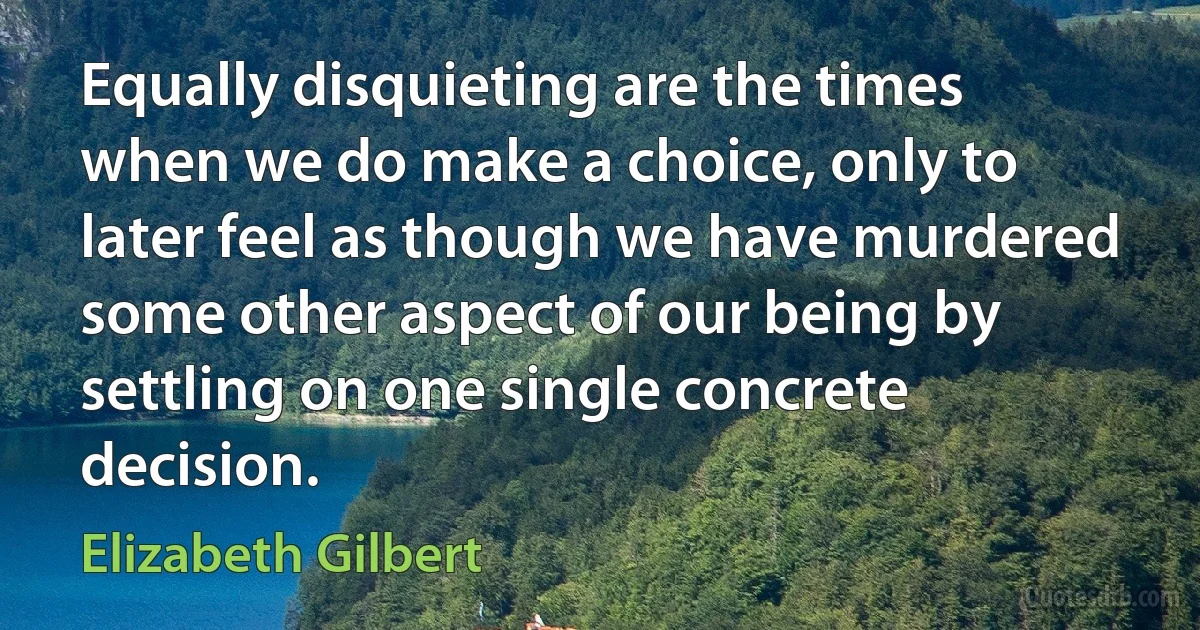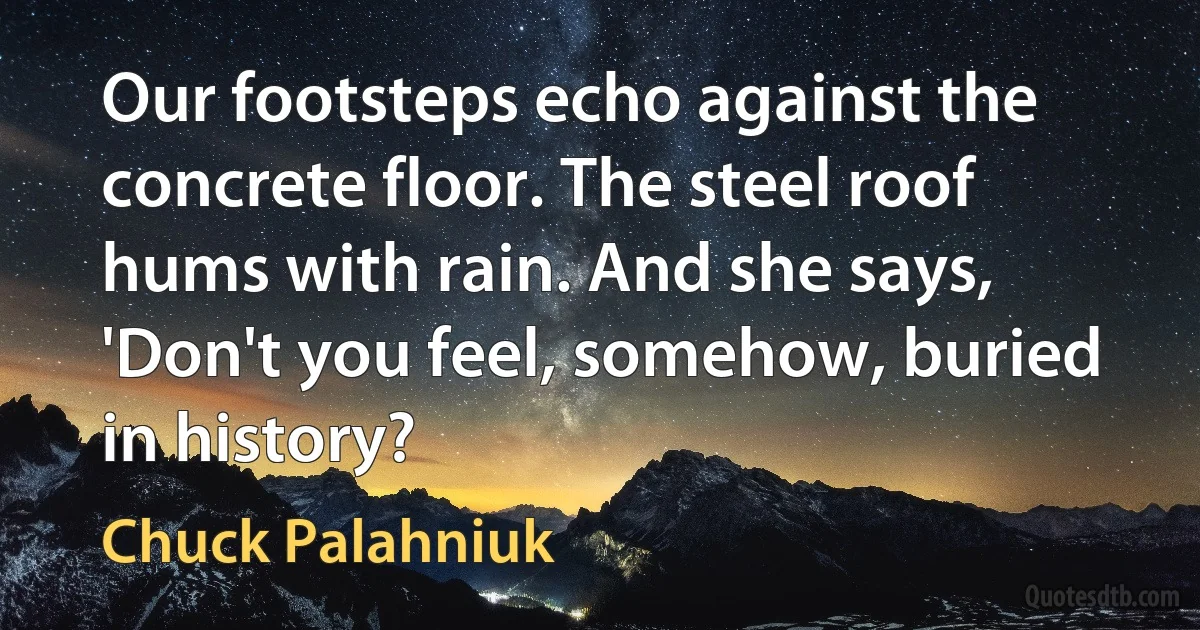Concrete Quotes - page 8
I would never talk just to be social. Now, to sit down with a bunch of engineers and talk about the latest concrete forming systems, that's really interesting. Talking with animal behaviorists or with someone who likes to sail, that's interesting. Information is interesting to me. But talking for the sake of talking, I find that quite boring.

Temple Grandin
The sculptor carves because he must. He needs the concrete form of stone and wood for the expression of his idea and experience, and when the idea forms the material is found at once. .... I have always preferred direct carving to modelling because I like the resistance of the hard material and feel happier working that way. Carving is more adapted to the expression of the accumulative idea of experience and clay to the visual attitude. An idea for carving must be clearly formed before starting and sustained during the long process of working; also, there are all the beauties of several hundreds of different stones and woods, and the idea must be in harmony with the qualities of each one carved; that harmony comes with the discovery of the most direct way of carving each material according to its nature.

Barbara Hepworth
The English language was created by poets, a five-hundred year enterprise of emotion and metaphor, the richest dialogue in world literature. French rhetorical models are too narrow for the English tradition. Most pernicious of French imports is the notion that there is no person behind a text. Is there anything more affected, aggressive, and relentlessly concrete than a Parisian intellectual behind his/her turgid text? The Parisian is a provincial when he pretends to speak for the universe.

Camille Paglia
Yes, the novel is about concrete living relationships, a man's love for a woman, a woman's betrayal of that love. But it is also about wealth, its great attraction as well as its destructive power, the carelessness that comes with it, and, yes, it is about the American dream, a dream of power and wealth, the beguiling light of Daisy's house and the port of entry to America. It is also about loss, about the perishability of dreams once they are transformed into hard reality. It is the longing, its immateriality, that makes the dream pure.

Azar Nafisi
The signal failure of the academic Marxists is in their obliviousness to the transformation of modern labor. In the age of mass media, power has shifted its meaning and loci. Capitalism, whatever its problems, remains the most efficient economic mechanism yet to bring the highest quality of life to the greatest number. Because I have studied the past, I know that, in America and under capitalism, I am the freest woman in history. Union blue-collar jobs now routinely pay higher salaries than are earned by most teachers. Physical labor, as a concrete skill occupation, is free of the soul-destroying office politics suffers by the Marxists' demonized managerial class, who take their jobs home with them and are in a continual funk of anxiety and neurosis. ... Unharried weekend leisure time is the center of working-class American life in ways the academic Marxists, resentfully marking papers and endlessly pressed for time, simply don't see.

Camille Paglia
The assumption that, beneath economics, reality is psychosexual is often rejected as ahistorical by those who accept a dialectical materialist view of history because it seems to land us back where Marx began: groping through a fog of utopian hypotheses, philosophical systems that might be right, that might be wrong (there is no way to tell); systems that explain concrete historical developments by a priori categories of thought; historical materialism, however, attempted to explain 'knowing' by 'being' and not vice versa.

Shulamith Firestone
If we deal with our problem not knowing, or pretending not to know the general theory encompassing the concrete case before us, if we tackle the problem "with bare hands", we have a better chance to understand the scientist's attitude in general, and especially the task of the applied mathematician.

George Pólya
Although today the Unification Church is being persecuted, I am grateful for it. If we did not receive opposition, where would the Unification Church be diverted to? Even when constructing a building, one must dig deep and lay down concrete. If one digs shallow and puts in the concrete, one cannot build a strong building. Because Jesus understood this situation, he could join his hands and pray for the sake of Satan.

Sun Myung Moon
Culture is best seen not as complexes of concrete behavior patterns - customs, usages, traditions, habit clusters - as has, by and large, been the case up to now, but as a set of control mechanisms - plans, recipes, rules, instructions (what computer engineers call "programs”) - for the governing of behavior.

Clifford Geertz
If you are going to build the Empire State Building, the first thing you need to do is dig a deep hole and pour a strong foundation. If you are going to build a home in the suburbs, all you need to do is pour a 6-inch slab of concrete. Most people, in their drive to get rich, are trying to build an Empire State Building on a 6-inch slab.

Robert Kiyosaki
Although dialogue, by itself, will not be sufficient to address these issues – because concrete action is needed – initiating a broad, frank, and inclusive conversation is a necessary and productive first step. In all of the Civil Rights Division's activities in Ferguson – as in every pattern-or-practice investigation the Division has launched over the last six years – our aim is to help facilitate and inform this conversation; to make certain it leads to concrete action; and to ensure that law enforcement officers in every part of the United States live up to the same high standards of professionalism. It is clear from our work throughout the country-particularly the work of our Civil Rights Division-that the prospect of police accountability and criminal justice reform is an achievable goal; one that we can reach with law enforcement and community members at the table as full partners.

Eric Holder
His overriding lesson for thinkers like Hutton was that scientists, even those occupied by an apparently ‘concrete' discipline like geology, need to be careful not just about what they claim to know but also about how they claim to know it. Human reason is a fragile thing and prone to be overthrown by suggestibility.

Stephen Baxter
Nothing mankind had done in its short and bloody history had made the slightest bit of difference to this patient geographical realignment.
Meanwhile the Earth, left to its own devices, had deployed a variety of healing mechanisms, physical, chemical, biological, and geological, to recover from the devastating interventions of its human inhabitants. Air pollutants had been broken up by sunlight and dispersed. Bog ore had absorbed much metallic waste. Vegetation had recolonized abandoned landscapes, roots breaking up concrete and asphalt, overgrowing ditches and canals. Erosion by wind and water had caused the final collapse of the last structures, washing it all into sand.
Meanwhile the relentless processes of variation and selection had worked to fill an empty world.

Stephen Baxter
I mean this report to serve as a sort of handbook detailing one sociological perspective from which social life can be studied, especially the kind of social life that is organised within the physical confines of a building or plant. A set of features will be described which together form a framework that can be applied to any concrete social establishment, be it domestic, industrial, or commercial.

Erving Goffman



